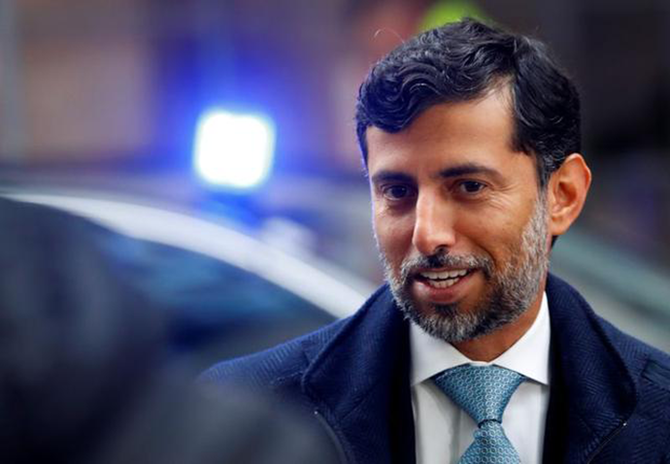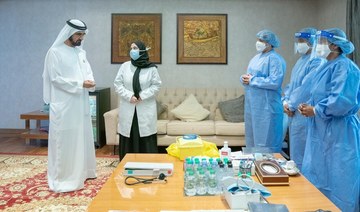LONDON: Emirati-British ties, and the UAE’s new relationship with Israel, will help forge a global path toward a more environmentally friendly future, the UAE’s Energy Minister Suhail Mohamed Al-Mazrouei said on Wednesday.
Speaking at a virtual panel hosted by the Emirates Society and attended by Arab News, he was joined by his UK counterpart Kwasi Kwarteng and Mohammed Jameel Al-Ramahi, CEO of Abu Dhabi-based Masdar, a global leader in renewable energy and sustainable urban development.
Al-Mazrouei said: “In the late 70s, I was living in a tent without electricity. It’s quite remarkable what happened to the country in the past 50 years. I think everyone has an appreciation of the value of energy because we were living on kerosene lamps.”
He added: “I think the tendency to use renewable energy is progressing. We’re seeing it in the houses we’re building as a government, and now we start to integrate solar (energy) into those houses that we give to the people.”
Al-Mazrouei said greater focus on renewables is leading to tangible results in terms of scope of use and value for money.
“We started in 2017 looking at the next 30 years with a strategy for the Emirates, the UAE Energy Strategy. Back then, we were almost relying 100 percent on natural gas. We committed to diversify up to 50 percent of energy sources to become zero emissions, and the majority of it is going to be solar,” he added.
“Because of the largescale projects and the long-term private and government relationships, we managed to reduce the cost to as low as $0.135 per kilowatt hour. A few years ago, we were talking about $0.5,” he said.
“Our strategy is not just to utilize renewable energy but also to capture CO2 (carbon dioxide) from industrial projects. And we have the Gulf’s first commercial carbon capture and utilization scheme, where we capture around 800,000 tons of CO2, and we inject it as a replacement for natural gas into one of our oil fields. After that success, we’re committed to go for 5 million tons by 2030.”
Central to that progress, Al-Mazrouei said, is international cooperation, with the UK and Israel prominent in his comments.
Al-Ramahi concurred, highlighting future partnerships with Israeli companies in fields such as water desalination — a vital but costly and environmentally harmful process — in which, Kwarteng said, Israel and the UAE are “streets ahead” of many others in the region.
Al-Ramahi said: “Masdar led the pilot Ghantoot water desalination program, where we assessed more than 20 water technologies globally. At that time, sadly, we didn’t have the Abraham Accords. We’d received a lot of interest from Israeli technology companies, but at that time we were unable to invite them. We (now) look forward to working closely with our Israeli friends in developing renewable energy programs both in Israel and elsewhere.”
Al-Mazrouei said: “We’re relying on desalinated water, more than 90 percent, and we’re trying to reduce the cost, and also the CO2 emissions associated with the different technologies in desalination. We agreed with Israel that we’d work together to try to maximize the efficiency and reduce the cost as much as possible.”
Al-Ramahi touched upon Masdar’s relationships with several UK bodies, universities and startups as evidence of the importance of the relationship between the two nations in leading the global energy revolution.
“We’ve made strategic investments around the world, in projects totaling £15 billion ($20.23 billion),” he said.
“Outside the UAE, our largest investment portfolio is in the UK; we’ve invested in renewable energy projects totaling close to £4 billion and over 1 gigawatt of energy. These projects power approximately 1 million homes, and are helping to reduce the UK’s CO2 emissions by almost 2 million tons per year, equivalent to removing around 430,000 cars from the roads,” he added.
“We’re a true believer that a sustainable future requires investment in educational institutions, in research and development, in youth directly. I believe we’ve demonstrated this by investing in the Graphene Engineering Innovation Centre in (the University of) Manchester,” he said.
“We’ve made these investments due to the commitment of the UK in providing the right platforms, stable policies, and a transparent process that international investors like Masdar look for.”
Al-Mazrouei said: “We’re very proud of the projects that we’ve done together in the UK, and we’re committed to do more in helping the diversification of the UK energy landscape.”
He added: “We have common interests with the UK in developing a hydrogen strategy … We’re also keen on developing technology, and are looking forward to cooperating with the UK in nuclear (energy) as well.”





















